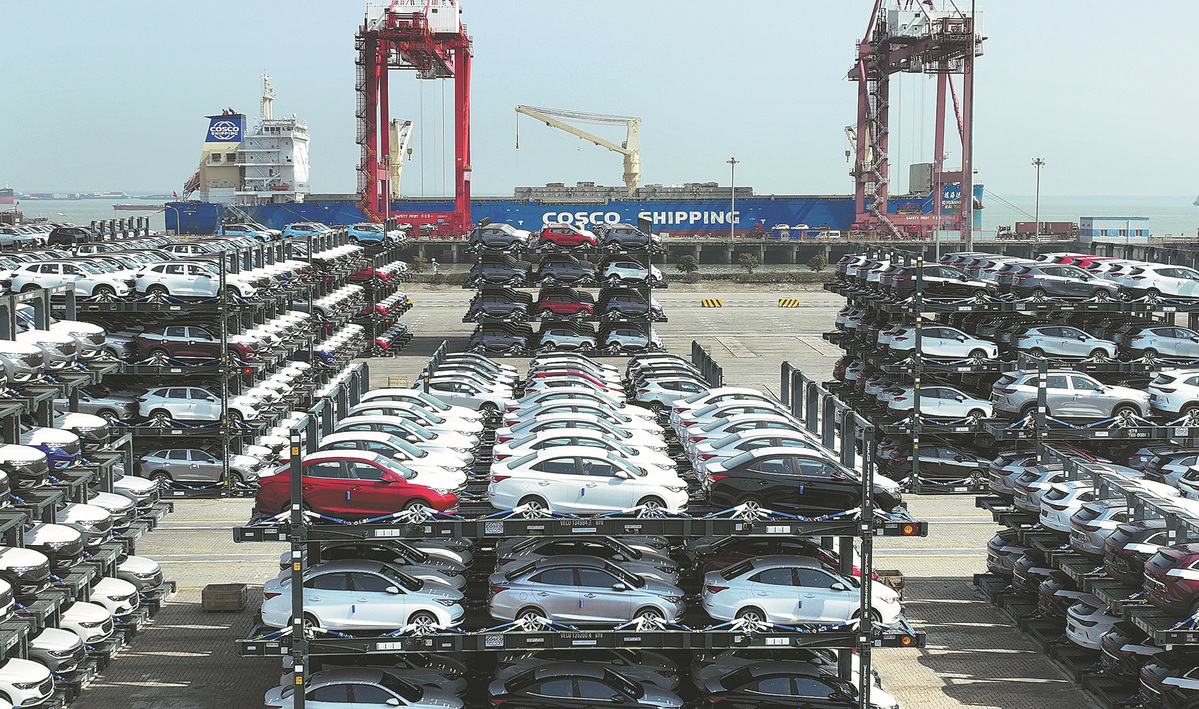中国的高新技术通往成功之路 - 2024-06-25

Vehicles from Chinese brands wait to be exported from a port in Suzhou, Jiangsu province.
No country changes as rapidly as China. Every decade marks a new era in business, governance, innovation, and socioeconomic development. This constant evolution is not merely a characteristic but the essence of China's dynamism, presenting a unique and compelling proposition for multinational companies to grow with the Chinese economy.
Each era creates immense opportunities for multinational companies to succeed in China. As China evolves, business strategies must adapt to stay ahead of the trends. Success here demands agility, foresight, and a deep understanding of the ever-shifting market dynamics.
In the 1980s, forward-thinking companies invested in early manufacturing, laying the foundation for China to become the "factory of the world". Those pioneers saw beyond the immediate challenges, envisioning the huge potential in China's vast, untapped resources and workforce. The 1990s saw a dramatic surge in foreign direct investment, expanding into diverse sectors such as infrastructure, communications and agriculture. That period was marked by a symbiotic relationship where China provided the growth environment, and multinational companies brought in expertise and capital.
Over the last 20 years, China's supply chain has evolved into a diversified powerhouse, offering everything from shoes and shirts to smartphones and satellites, and the massive domestic consumer base has created a vast market for international products. The sophistication and scale of China's manufacturing capabilities have reshaped global commerce.
The impact of China's transformation on global trade has been profound. And China's focus on new quality productive forces is bound to make the present era into a new phase of quality production and technological advancement.
While China's consumer market remains enormous, international brands now face fierce competition from sophisticated local brands which align closely with Chinese consumers' tastes and demands. To succeed in such a market, international brands need to offer products that suit Chinese consumers' tastes. Understanding the nuanced preferences of Chinese consumers is crucial, and those who do so by integrating local insights with global best practices will thrive in the vast Chinese market.
The investment and manufacturing landscape too is evolving in this new era of higher competition, rapidly advancing technology and globally-focused Chinese companies. Previously, knowledge, investment and technologies flowed into China, now they are flowing outward. This shift marks a significant change in China's role on the global stage, from a receiver of foreign expertise to an innovation and export powerhouse.
Chinese companies are occupying the global stage like never before. Nearly every global industry now has competitive Chinese companies, and some sectors such as clean energy technology, electric vehicles and smart home appliances are dominated by Chinese brands. The global presence of Chinese companies offers new avenues for international collaboration and competition.
These companies have developed technologies at home and expanded worldwide, creating new investment opportunities. The narrative is no longer about foreign companies coming to China to sell and manufacture goods; it is about partnering with Chinese companies to innovate and grow on a global scale.
China's new era is characterized by high-tech innovation, industrial development and robust industry and supply chains. Despite complexities isolating China's high-tech innovation for long, intense domestic and global competition has driven its progress. Global investors not engaged in this development are missing out on significant opportunities, especially because China's emphasis on research and development has led to breakthroughs in fields such as artificial intelligence, biotechnology and renewable energy.
One of the biggest opportunities lies in being part of China's future industrial development. Foreign companies have the chance to collaborate with China in developing technologies for the future. Given China's complete industry and supply chains, world-class infrastructure and skilled workforce, foreign companies and researchers will find an ideal environment for developing new technologies. This collaboration is not just about leveraging resources but also about being part of an ecosystem that fosters rapid prototyping, testing and scaling.
Another key opportunity for foreign companies is China's focus on further improving its industry and supply chains. With decades of infrastructure development and competent regional high-tech hubs, China is set to promote rapid innovation, and improve production and distribution. The efficiency and speed with which products can be developed and supplied to the market in China are unmatched.
In today's China, companies can find everything they need to develop and make high-tech products in one city. From the software development hub of Shenzhen to energy storage and EVs in Hefei, Anhui province, companies can complete projects without sourcing from around the world. This concentration of resources not only reduces costs but also enhances the speed of innovation cycles.
This system also benefits low-end goods production. China's vast network of original design manufacturers (ODMs) and original equipment manufacturers (OEMs) allows companies to utilize existing facilities and personnel to expeditiously manufacture products. Many of the world's biggest companies, both domestic and foreign, have taken advantage of China's mature ODM/OEM networks for producing everything from apparel to tools and appliances, and quickly meet market demands.
While nothing beats being on the ground to seize these opportunities, a willingness to adapt to the Chinese market is the first step toward success. Indeed, the future of global business will be shaped by those who can navigate and leverage the intricate and ever-evolving landscape of China.
The author is Chris Pereira, the founder and CEO of iMpact, a communications and business consulting group.
Source: China Daily
